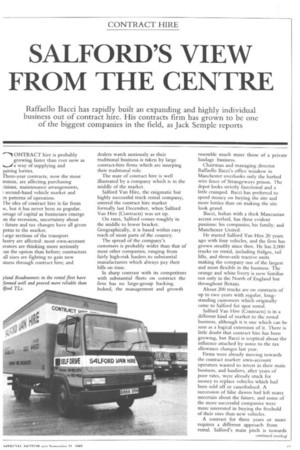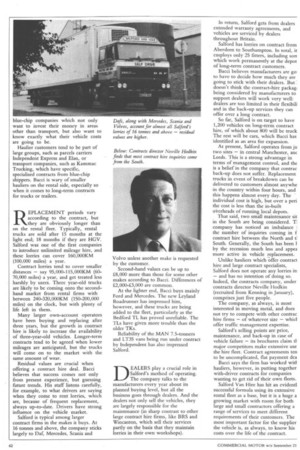SALFORD'S VIEW FROM THE CENTRE
Page 63

Page 64

If you've noticed an error in this article please click here to report it so we can fix it.
Raffaello Bacci has rapidly built an expanding and highly individual business out of contract hire. His contracts firm has grown to be one of the biggest companies in the field, as Jack Semple reports
ONTRACT hire is probably growing faster than ever now as a way of supplying and
iuiring lorries.
Three-year contracts, now the most mmon, are affecting purchasing zisions, maintenance arrangements, second-hand vehicle market and ni patterns of operation.
The idea of contract hire is far from inr, but it has never been so popular. ortage of capital as businesses emerge ■ m the recession, uncertainty about t future and tax changes have all given petus to the market.
Large sections of the transport Iustry are affected: most own-account erators are thinking more seriously nit the option than before; contractors all sizes are fighting to gain new siness through contract hire; and dealers watch anxiously as their traditional business is taken by large contract-hire firms which are usurping their traditional role.
The state of contract hire is well illustrated by a company which is in the middle of the market.
Salford Van Hire, the enigmatic but highly successful truck rental company, entered the contract hire market formally last December, when Salford Van Hire (Contracts) was set up.
On rates, Salford comes roughly in the middle to lower bracket. Geographically, it is based within easy reach of most parts of the country.
The spread of the company's customers is probably wider than that of most other companies, ranging from fairly high-risk haulers to substantial manufacturers which always pay their bills on time.
In sharp contrast with its competitors with substantial fleets on contract the firm has no large-group backing. Indeed, the management and growth resemble much more those of a private haulage business.
Chairman and managing director Raffaello Bacci's office window in Manchester overlooks only the barbed wire fence of Strangeways prison. The depot looks strictly functional and a little cramped. Bacci has preferred to spend money on buying the site and more lorries than on making the site look grand.
Bacci, Italian with a thick Mancunian accent overlaid, has three evident passions: his companies; his family; and Manchester United.
He started Salford Van Hire 20 years ago with four vehicles, and the firm has grown steadily since then. He has 2,000 trucks on rental, including fridges, tail lifts, and three-axle tractive units making the company one of the largest and most flexible in the business. The orange and white livery is now familiar not only in the North of England but throughout Britain.
About 200 trucks are on contracts of up to two years with regular, longstanding customers which originally came to Salford for spot rental.
Salford Van Hire (Contracts) is in a different kind of market to the rental business, although it is one which can be seen as a logical extension of it There is little doubt that contract hire has been growing, but Bacci is sceptical about the influence attached by sonic to the tax allowance changes last year.
Firms were already moving towards the contract market: own-account operators wanted to invest in their main business, and hauliers, after years of poor rates, were already stuck for money to replace vehicles which had been sold off or cannibalised. A succession of false dawns had left many uncertain about the future, and some of the more successful companies were more interested in buying the freehold of their sites than new vehicles.
A contract for three years or more requires a different approach from rental. Salford's main pitch is towards blue-chip companies which not only want to invest their money in areas other than transport, but also want to know exactly what their vehicle costs are going to be.
Haulier customers tend to be part of large groups, such as parcels carriers Independent Express and Elan, or transport companies, such as Kammac Trucking, which have specific, specialised contracts from blue-chip shippers. Bacci is wary of smaller hauliers on the rental side, especially so when it comes to long-term contracts for trucks or trailers.
REPLACEMENT periods vary according to the contract, but they are obviously longer than on the rental fleet. Typically, rental trucks are sold after 15 months at the light end; 18 months if they are HGV. Salford was one of the first companies to introduce unlimited mileage hire, and these lorries can cover 160,000KM (100,000 miles) a year.
Contract lorries tend to cover smaller distances — say 95,000-115,000KM (6070,000 miles) a year, and get treated less harshly by users. Three year-old trucks are likely to be coming onto the secondhand market from rental firms with between 240-320,000KM (150-200,000 miles) on the clock, but with plenty of life left in them.
Many larger own-account operators have been buying and replacing after three years, but the growth in contract hire is likely to increase the availability of three-year-old vehicles. Longer-term contracts tend to be agreed when lower mileages are anticipated, but the trucks will come on to the market with the same amount of wear.
Residual values are crucial when offering a contract hire deal. Bacci believes that success comes not only from present experience, but guessing future trends. His staff listens carefully, for example, to what drivers are saying when they come to rent lorries, which are, because of frequent replacement, always up-to-date. Drivers have strong influence on the vehicle market.
Salford is typical among larger contract firms in the makes it buys. At 16 tonnes and above, the company sticks largely to Daf, Mercedes, Scania and Volvo unless another make is requested by the customer.
Second-hand values can be up to £8,000 more than those for some other makes according to Bacci. Differences of £2,00043,000 are common.
At the lighter end, Bacci buys mainly Ford and Mercedes. The new Leyland Roadrunner has impressed him, however, and these trucks are being added to the fleet, particularly as the Bedford TL has proved unreliable. The TLs have given more trouble than the older TKs.
Reliability of the MAN 7.5-tonners and LT35 vans being run under contract by Independent has also impressed Salford.
DEALERS play a crucial role in Salford's method of operating. The company talks to the manufacturers every year about its planned buying level, but all the business goes through dealers. And the dealers not only sell the vehicles, they are largely responsible for the maintenance (in sharp contrast to other large contract hire firms, like BRS and Wincanton, which sell their services partly on the basis that they maintain lorries in their own workshops).
In return, Salford gets from dealers extended warranty agreements, and vehicles are serviced by dealers throughout Britain.
Salford has lorries on contract from Aberdeen to Southampton. In total, it employs only 25 fitters, including son which work permanently at the depot of long-term contract customers.
Bacci believes manufacturers are go: to have to decide how much they are going to stick with their dealers. But I doesn't think the contract-hire packag, being considered by manufacturers to support dealers will work very well: dealers are too limited in their flexibili and in the back-up services they can offer over a long contract.
So far, Salford is on target to have 1,200 vehicles on long-term contract hire, of which about 800 will be truck The rest will be cars, which Bacci has identified as an area for expansion.
At present, Salford operates from ju two sites — in central Manchester, anc Leeds. This is a strong advantage in terms of management control, and the is a belief in the company that contrac back-up does not suffer. Replacement trucks in event of breakdown can be delivered to customers almost anywhe in the country within four hours, and this happens almost every day. The individual cost is high, but over a peni the cost is less than the in-built overheads of running local depots. That said, two small maintenance sit in the South are being considered. TI company has noticed an imbalance the number of inquiries coming in f contract hire between the North and ti South. Generally, the South has been by the recession much less and appea more active in vehicle replacement.
Unlike hauliers which offer contract hire and large contract specialists, Salford does not operate any lorries in — and has no intention of doing so. Indeed, the contracts company, under contracts director Neville Hodkin (recruited from Kenning in January), comprises just five people.
The company, as always, is most interested in moving metal, and does not try to compete with other contrac hire firms — of whatever size — whiel offer traffic management expertise.
Salford's selling points are price, maintenance, and back-up in case of vehicle failure — its brochures claim a major competitors make extensive use the hire fleet. Contract agreements ten to be uncomplicated, flat payment dca
Bacci says the firm has worked witlhauliers, however, in putting together with-driver contracts for companies wanting to get rid of their own fleets.
Salford Van Hire has hit an evidentl successful formula using its extensive rental fleet as a base, but it is a huge a growing market with room for both. large and small contractors offering a range of services to meet different requirements of their customers. The most important factor for the supplier the vehicle is, as always, to know his costs over the life of the contract.




































































































